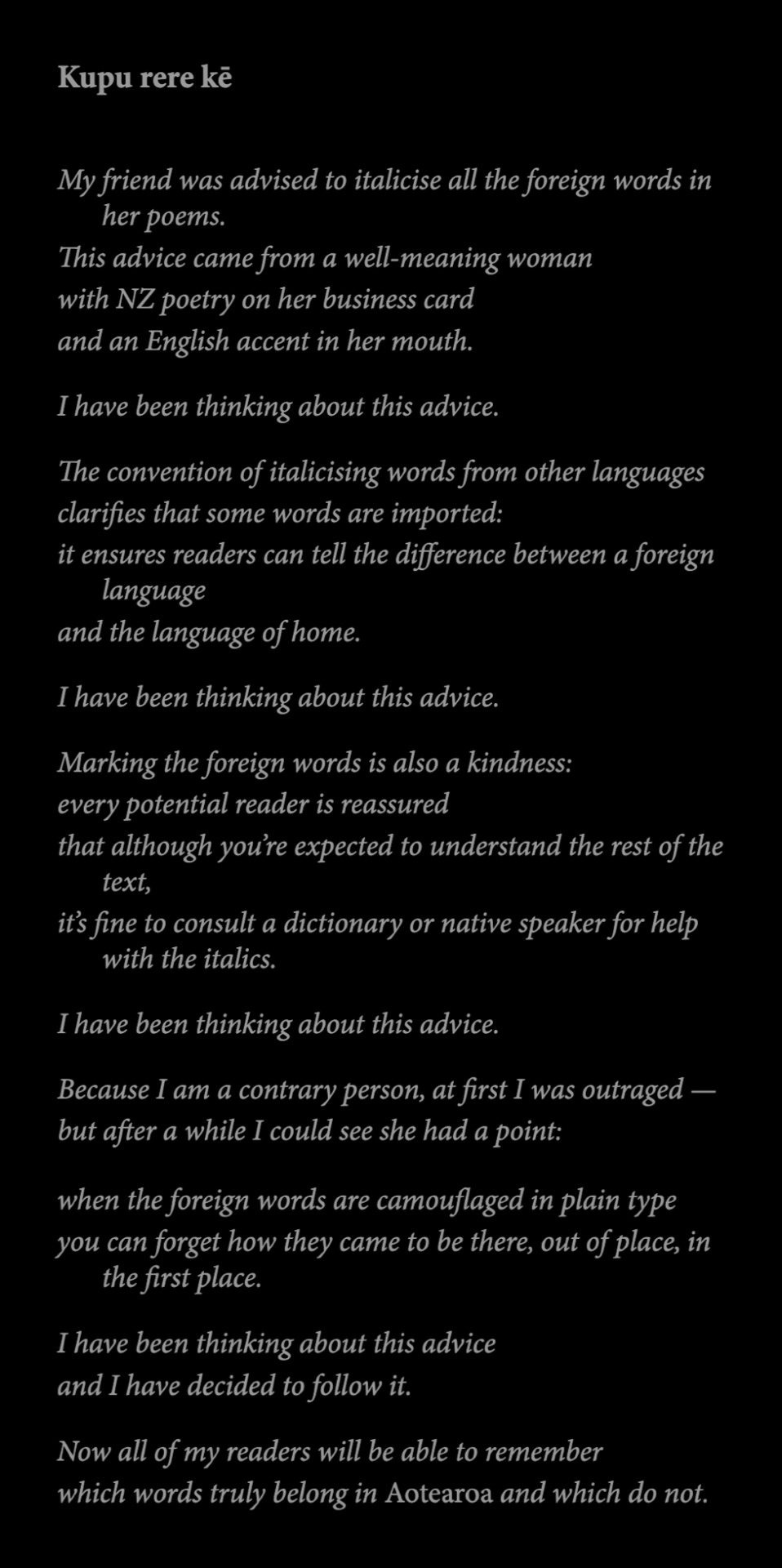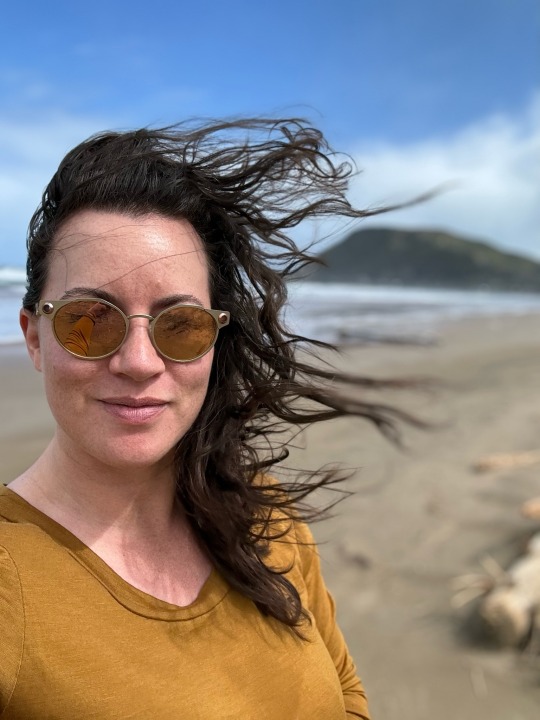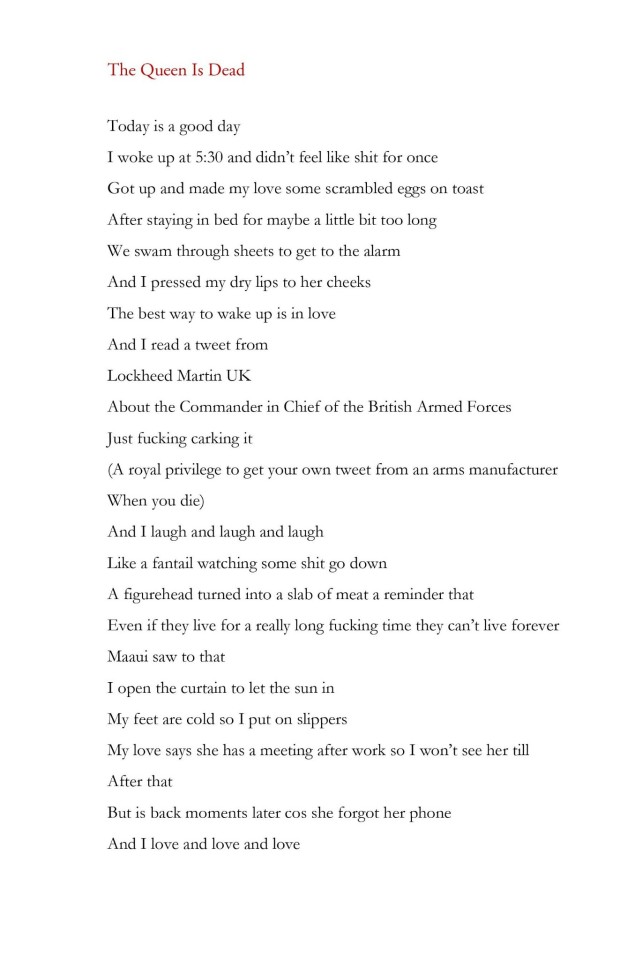#Māori poetry
Text

Alice Te Punga Somerville, Always Italicise: How to Write While Colonised - Kupu rere kē
[ID: A poem titled: Kupu rere kē. [in italics] My friend was advised to italicise all the foreign words in her poems. This advice came from a well-meaning woman with NZ poetry on her business card and an English accent in her mouth. I have been thinking about this advice. The convention of italicising words from other languages clarifies that some words are imported: it ensures readers can tell the difference between a foreign language and the language of home. I have been thinking about this advice. Marking the foreign words is also a kindness: every potential reader is reassured that although you're expected to understand the rest of the text, it's fine to consult a dictionary or native speaker for help with the italics. I have been thinking about this advice. Because I am a contrary person, at first I was outraged — but after a while I could see she had a point: when the foreign words are camouflaged in plain type you can forget how they came to be there, out of place, in the first place. I have been thinking about this advice and I have decided to follow it. Now all of my readers will be able to remember which words truly belong in -[end italics]- Aotearoa -[italics]- and which do not.
Next image is the futurama meme: to shreds you say...]
(Image ID by @bisexualshakespeare)

#powerful right off the bat#Alice Te Punga Somerville#Always Italicise#Always Italicise: How to Write While Colonised#new zealand poem#Always Italicise How to Write While Colonised#Kupu rere kē#aotearoa#quote#quotes#poem#poetry#Māori poetry#Māori#colonization#colonisation#Decolonisation#Te reo māori#Decolonization#new zealand#new zealand poetry
77K notes
·
View notes
Text
"My friend was advised to italicise all the foreign words in her poems."
Read it here | Reblog for a larger sample size!
#closed polls#polls#poetry#poems#poetry polls#poets and writing#tumblr poetry#have you read this#kupu rere kē#alice te punga somerville#māori poetry#te reo māori#admin faves
22 notes
·
View notes
Text

#powerful right off the bat#Alice Te Punga Somerville#Always Italicise#Always Italicise: How to Write While Colonised#new zealand poem#Always Italicise How to Write While Colonised#Kupu rere kē#aotearoa#quote#quotes#poem#poetry#Māori poetry#Māori#colonization#colonisation#Decolonisation#Te reo māori#Decolonization#new zealand#new zealand poetry
17 notes
·
View notes
Text
Kupu here kē
My friend was advised to italicise all the foreign words in her poems.
This advice came from a well-meaning woman
with NZ poetry on her business card
and an English accent in her mouth.
I have been thinking about this advice.
The convention of italicising words from other languages
clarifies that some words are imported:
it ensures readers can tell the difference between a foreign language
and the language of home.
I have been thinking about this advice.
Marking the foreign words is also a kindness:
every potential reader is reassured
that although you're expected to understand the rest of the text,
it's fine to consult a dictionary or native speaker for help with the italics.
I have been thinking about this advice.
Because I am a contrary person, at first I was outraged --
but after a while I could see she had a point:
when the foreign words are camouflagued in plain type
you can forget how they came to be there, out of place, in the first place.
I have been thinking about this advice
and I have decided to follow it.
Now all of my readers will be able to remember
which words truly belong in Aotearoa and which do not.
Alice Te Punga Somerville (Te Āti Awa, Taranaki)
Always Italicise: how to write while colonised
Auckland University Press 2022; purchase link in comments
#poetry#new zealand#aotearoa#alice te punga somerville#māori poetry#linguistics#language#i love this poem#break the lines
1 note
·
View note
Text
A poem about how time is a circle, echoing down through the generations. And also colonisation and psychosis, I suppose.
You, my tūpuna
A hundred years after
the empire came.
Forced into a school,
Forced to speak the
Queen's English.
You didn't know how
you didn't kōrero their reo
so you stayed quiet
to avoid punishment.
Yet punish you they did
for disobedience
for not listening
for silence.
Me, your moko,
Two hundred fifty years
After the empire came.
Forced into a school,
Forced to be a good student.
I had a split
from reality.
Stayed quiet to avoid
killing everyone
as the delusion said speaking would do
Yet they still punished me
for disobedience
for not listening
for silence.
A hundred fifty years between us
Yet I feel the echo of you in me
A hundred fifty years between us
Yet the colonisation lives on
A hundred fifty years between us
Yet we are a pool of water reflecting each other
They see our silence as breaking their rules,
I see it as survival.
26 notes
·
View notes
Text
Karanga mai,
e te moana o aku tīpuna
Ka huri au, ka rongo ki a Tangaroa
Ka hurihia, ka pūawhehia au e Tāwhiri-mātea
Whakatakina ai aku tātai
———
Call me forth
The ocean of my ancestors
I turn to, I listen to/sense Tangaroa [God of the Ocean]
I am turned and blown about Tāwhiri-mātea [God of the Wind]
In search of my heritage / Reciting my lineage

#poem#original poem#original writing#queer poetry#poetry#short poem#aotearoa#te reo maori#te reo māori#identity#indigenous#new zealand#gisborne#tairāwhiti#bilingual#prose poetry
16 notes
·
View notes
Text
I recently used an extended experience of transphobia I endured in writing for a university assignment. I wrote a last bit in te reo Māori, not as something for more context for the assignment, but for myself.
Although my experience turned out ok, it damaged my mana in a way that I can’t quite move on from. Even now, a month and a half out from it, I still don’t feel like my mana is fully restored. It makes me feel weak to not have healed by now, it makes me feel that I’m not cut out to pursue the career I want to pursue.
After reflecting upon it and using academic language to describe it, I needed something more. I needed something to help me move on. And so, I wrote the following.
Kia kaha ki ōku whānau takatāpui katoa
Ahakoa te wero
Ahakoa te mamae
Ahakoa te aha
Be strong all of my queer whānau
No matter the challenge
No matter the hurt
No matter what
It started as something to say to myself quietly, and to a professor who might not even understand it. I hoped that it would make me feel better, that if I can say it to other people, they would say it to me. That if they said it to me, I could believe in its meaning, it could apply to me, I could be strong no matter what.
The hope that it would make me feel better hasn’t come to fruition yet unfortunately, but I also have hope that it will. Because really, if I don’t have hope, hope that my words will resonate, hope that the world will get better, hope that I will get better, what else do I have?
I hope that you, yes you reading this right now, can take strength from this. I hope your queer whānau can take strength from this.
I hope that we can all be strong. No matter what.
11 notes
·
View notes
Text
It is said that they worked
From dawn until dusk
Not for world peace
But pieces of the world
Pieces of dirt
Ripped out the roots
All of our energy
Wasted on
The earth was split
Taxed and owned
Who needs to share
When you can have shares
You could each have your own
That’s what they said
No need for each other
Sharing is sparing
Look over there
They want it too
You better go hide
And don’t look outside
We stayed in our corners
Clutching it tight
Worried for the day
We’d have to fight
Whatever was left
Broken and shattered
Not from devils
But angels that scattered
To each their own
Not for each other
Only against what
Nature was left
You wouldn’t believe it
If you saw for yourself
We trades sky and sea creatures
For metal and screens.
We watched them there
What wasn’t alive.
We reminisced
While there was still time
We don’t know who
Made things this way
But we know
Who watched and stayed
#powerful right off the bat#Always Italicise#Always Italicise: How to Write While Colonised#Always Italicise How to Write While Colonised#aotearoa#quote#quotes#poem#poetry#colonization#colonisation#Decolonisation#Te reo māori#Decolonization#dystopia#black mirror#capitalism
5 notes
·
View notes
Text

from te kōtahekore ranapiri on twitter
#rj speaks#te kōtahekore ranapiri#the queen is dead#poetry#māori artists#māori poets#trans poets#transfem poets#aotearoa
36 notes
·
View notes
Text
cw: identity stuff
white girl
a poem by me
sometimes i look in the mirror half-expecting to see a white girl
thin features honey hair and blue eyes like my mother's
sometimes i am almost surprised
to see the broad nose wide mouth forehead too big and the bent crooked hair that never seems to frame it right
and the color, just tan, that's all, but darker than family reunions and darker than smiles in stories and sometimes
sometimes i can't quite make it my face in my mind and sometimes
i screw up my nose and i scowl my eyebrows above wide wide eyes and stick out my tongue just to see the strange face in the mirror
my face it's my face it's me
to see the face in the mirror make a fierce pūkana at me, and whetero too
not white like my mother and not a girl either
but not of the island where my father's father is buried, not at all, and not a man
just a brown face brown eyes in the wrong places frown lips in the wrong shape
even if sometimes i almost don't recognize
my face it's my face it's me.
#mixed race#maori#nonbinary#poetry#identity issues#ethnicity#whiteness#my poetry#original poem#free verse#te reo māori
1 note
·
View note
Text
Kupu rere kē
My friend was advised to italicise all the foreign words in her poems.
This advice came from a well-meaning woman
with NZ poetry on her business card
and an English accent in her mouth.
I have been thinking about this advice.
The convention of italicising words from other languages
clarifies that some words are imported:
it ensures readers can tell the difference between a foreign language
and the language of home.
I have been thinking about this advice.
Marking the foreign words is also a kindness:
every potential reader is reassured
that although you’re expected to understand the rest of the text,
it’s fine to consult a dictionary or native speaker for help with the italics.
I have been thinking about this advice.
Because I am a contrary person, at first I was outraged —
but after a while I could see she had a point:
when the foreign words are camouflaged in plain type
you can forget how they came to be there, out of place, in the first place.
I have been thinking about this advice
and I have decided to follow it.
Now all of my readers will be able to remember
which words truly belong in Aotearoa and which do not.
Alice Te Punga Somerville, Always Italicise: How to Write While Colonised - Kupu rere kē
#Alice Te Punga Somerville#A few people mentioned wanting a text version for accessibility...#powerful right off the bat#Always Italicise#Always Italicise: How to Write While Colonised#Always Italicise How to Write While Colonised#Kupu rere kē#aotearoa#colonization#colonisation#Decolonisation#Te reo māori#Decolonization#quote#quotes#poem#poetry#Māori poetry#Māori#new zealand#new zealand poetry#new zealand poem
588 notes
·
View notes
Text
te reo Māori
You will not speak Māori!
Tame Iti*, then a child, punished
Many 100 lines later
For a simple act of defiance
Until “te reo Māori” was heard, so proud
It could no longer be cowed!
Today new government, old agenda
The first 100 days resurrected
A global anglosphere renaissance
That began with Brexit and the masses
Aspiring to quell resistance
and burn the Treaty of Waitangi to ashes
Wind back time 100 years
Hitler wrote how those who weld power must
“with brutal ruthlessness press through”
creating harmful policies that
enact their sense of right
the systemic genocide of Māori finally in sight!
Be warned. A tidal wave is brewing
A new and stronger generation of warriors is rising up
your 184 years of oppression no longer assured
You should have learnt your lesson
Many 100 lines ago………………
te reo Māori WILL endure!
Note: Tame Iti, a key warrior of the Māori renaissance, was as a child forced to write 100 lines “I Will Not Speak Māori” each time he spoke te reo Māori.
The newly elected New Zealand Government have signed to a coalition that will either repeal or review at least a dozen Māori related policies including abolishing the Māori Health Authority, set up to address appalling health disparities and rolling back the use of the endangered Māori language, te reo Māori.
1 note
·
View note
Text

#powerful right off the bat#Alice Te Punga Somerville#Always Italicise#Always Italicise: How to Write While Colonised#new zealand poem#Always Italicise How to Write While Colonised#Kupu rere kē#aotearoa#quote#quotes#poem#poetry#Māori poetry#Māori#colonization#colonisation#Decolonisation#Te reo māori#Decolonization#new zealand#new zealand poetry
1 note
·
View note
Text
Stories of legends lost to history,
Only living on through
Those who continue to tell their tale.
~Oko
#been researching Māori culture recently because I really want to go to New Zealand#need to find someone to gift a pounamu to#I love cultures#anthropology poem#literature#books & libraries#quote#original poetry#writer#books#light academia#dark academia#storiesofoko
1 note
·
View note
Text
Since my big Languages and Linguistics MEGA folder post is approaching 200k notes (wow) I am celebrating with some highlights from my collection:
Africa: over 90 languages so far. The Swahili and Amharic resources are pretty decent so far and I'm constantly on the lookout for more languages and more resources.
The Americas: over 100 languages of North America and over 80 languages of Central and South America and the Caribbean. Check out the different varieties for Quechua and my Navajo followers are invited to check out the selection of Navajo books, some of which are apparently rare to come by in print.
Ancient and Medieval Languages: "only" 18 languages so far but I'm pretty pleased with the selection of Latin and Old/Middle English books.
Asia: over 130 languages and I want to highlight the diversity of 16 Arabic dialects covered.
Australia: over 40 languages so far.
Constructed Languages: over a dozen languages, including Hamlet in the original Klingon.
Creoles: two dozen languages and some materials on creole linguistics.
Europe: over 60 languages. I want to highlight the generous donations I have received, including but not limited to Aragonese, Catalan, Occitan and 6 Sámi languages. I also want to highlight the Spanish literature section and a growing collection of World Englishes.
Eurasia: over 25 languages that were classified as Eurasian to avoid discussions whether they belong in Europe or Asia. If you can't find a language in either folder it might be there.
History, Culture, Science etc: Everything not language related but interesting, including a collection of "very short introductions", a growing collection of queer and gender studies books, a lot on horror and monsters, a varied history section (with a hidden compartment of the Aubreyad books ssshhhh), and small collections from everything like ethnobotany to travel guides.
Jewish Languages: 8 languages, a pretty extensive selection of Yiddish textbooks, grammars, dictionaries and literature, as well as several books on Jewish religion, culture and history.
Linguistics: 15 folders and a little bit of everything, including pop linguistics for people who want to get started. You can also find a lot of the books I used during my linguistics degree in several folders, especially the sociolinguistics one.
Literature: I have a collection of classic and modern classic literature, poetry and short stories, with a focus on the over 140 poetry collections from around the world so far.
Polynesia, Micronesia, Melanesia: over 40 languages and I want to highlight the collection for Māori, Cook Islands Māori and Moriori.
Programming Languages: Not often included in these lists but I got some for you (roughly 5)
Sign Languages: over 30 languages and books on sign language histories and Deaf cultures. I want to highlight especially the book on Martha's Vineyard Sign Language and the biography of Laura Redden Searing.
Translation Studies: Everything a translation student needs with a growing audiovisual translation collection
And the best news: the folders are still being updated regularly!
2K notes
·
View notes
Text
A poem of girlhood and after by Indigenous New Zealander Tayi Tibble, whose second collection, Rangikura, comes out in America today. In the dictionary of Māori language, hōmiromiro is defined as “a white-breasted North Island tomtit…a little black-and-white bird with a large head and short tail.” It is often used to refer to someone with a tomtit’s keen vision—that is, a sharp eye for detail.
Hōmiromiro
I used to dream
about a two-headed goldfish.
I took it for an omen.
I smashed a milk bottle open
on a boiling road and watched
a three-legged dog lick it up
and in the process I became
not myself but a single shard
of glass and thought finally
I had starved myself skinny enough
to slip into the splits of the universe
but once I did I realised that the universe
was no place for a young thing to be
and there is always a lot more starving to be had.
When I was a girl I thought
I was Daisy Buchanan.
I read on the train.
I made voluminous eyes.
Once I walked in front of a bus and it exploded
into a million monarch butterflies
then I was ecstatic!
As a girl, I could only fathom
time as rose petals falling
down my oesophagus.
It tickled and it frightened me.
I ran around choking for attention.
I had projections of myself
at 100
my neck weathered and adorned
like the boards of a home
being eaten by the earth.
When I was a girl I would lie
on the side of that road
in the last lick of sun and wait
for the rabbits to come saluting
the sky of orange dust
and then I would shoot them into outer space.
For many years I watched them
bouncing on the moon.
But then I stopped caring and so
I stopped looking.
More on this book and author:
Learn more about Rangikura by Tayi Tibble.
Browse other books by Tayi Tibble and follow her on Instagram @paniaofthekeef.
Hear Tayi Tibble and Harryette Mullen read from their new poetry collections at Beyond Baroque in Los Angeles, CA on April 10 at 8:00 PM. Tayi Tibble will be joined by Sasha LaPointe in Washington for a series of readings and conversations at Elliot Bay Book Company in Seattle on April 13 at 7:00 PM, at King's Books in Tacoma on April 14 at 1:00 PM, at Bainbridge Island Museum of Art in Bainbridge on April 15 at 7:00 PM, and at Third Place Books in Seattle, Lake Forest Park, on April 16 at 7:00 PM. Tayi and Sasha will also be at Broadway Books in Portland, OR, on April 17 at 6:00 PM. Tayi will be at the LA Times Book Festival signing books at the ALTA booth (Booth 111) on April 20 at 11:00 AM.
Visit our Tumblr to peruse poems, audio recordings, and broadsides in the Knopf poem-a-day series.
To share the poem-a-day experience with friends, pass along this link.
#TibbleAudio#poetry#knopf#poem-a-day#knopf poetry#national poetry month#poetry month#knopfpoetry#poem#tayi tibble#rangikura#homirmiro
96 notes
·
View notes